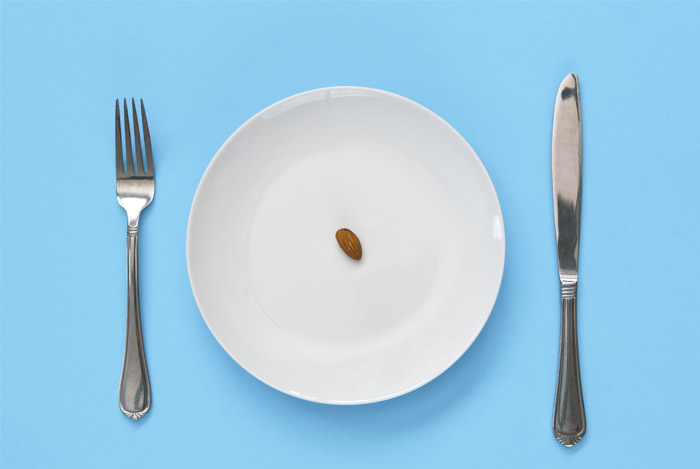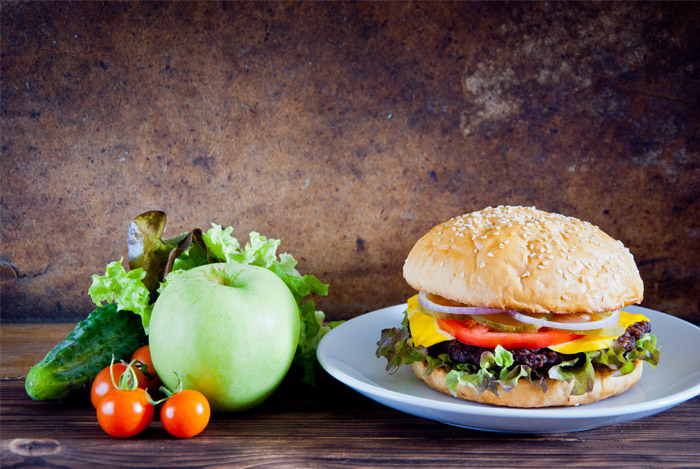The idea of cheat meals may seem a little counter intuitive at first. Why spend all week sticking to a strict, calorie controlled diet, only to undo it all in one evening of indulgence?
But, on the other hand, many people struggle to keep going on their healthy path when there’s no chocolate covered end in sight. These people claim a cheat meal helps them stay on course.
It’s these two schools of thought that have divided the health world when it comes to ‘cheating’.
But, as always, I like to look at the science. And the science seems to say that cheating on your diet can actually be beneficial in a number of ways!
Yes, you read that correctly – indulging your sweet tooth may just help your weight loss goals.
So here they are – five reasons, backed by science, which demonstrate that cheat meals are a good thing.
Make sure to check out my tips at the bottom of the article that show you how to cheat right, and how to deal with falling off the wagon.
Regulate Appetite Hormones
 Our appetite is controlled by more than just what’s in our bellies! Two hormones – ghrelin and leptin – play a huge role in how great and how frequent our hunger pangs are.
Our appetite is controlled by more than just what’s in our bellies! Two hormones – ghrelin and leptin – play a huge role in how great and how frequent our hunger pangs are.
Leptin is known as the appetite-suppressing hormone, while ghrelin is the hunger stimulating one.
Research has shown significant changes in the levels of both leptin and ghrelin within 24 to 72 hours of fasting. When we stick to a calorie restricted diet, we may be causing our leptin levels to fall, and our ghrelin levels to rise.
By temporarily increasing calorie intake – through a cheat meal – our bodies can regulate the levels of these hormones in our body, causing our appetite to be kept in check.
One study has shown that leptin production can be boosted by almost 30% for up to 24 hours after indulging in a carbohydrate-rich meal.
By having these hormone levels return to normal, we can help manage our hunger levels and drive up our energy expenditure.
As leptin levels can drop within days of fasting, and the effects of cheating can last for 24 hours or so, it might be a good idea for some people to actually schedule in regular cheat meals to take advantage of these time periods.
It’s important to note that levels of leptin in the body are lower when you’re thin and higher when you’re fat. So if you’re just beginning on your weight loss journey, you have less of a need to cheat on your diet than those who are near their ideal weight.
As many dieters know, when you’re nearing your goal weight you may be more likely to experience an incredibly frustrating weight loss plateau. But, thanks to its hormone regulating and metabolism boosting abilities, a carefully planned cheat meal may help you break through these!
Optimize Thyroid Hormones
 Another class of hormones that can be affected by dieting are the thyroid hormones, specifically the hormone T3.
Another class of hormones that can be affected by dieting are the thyroid hormones, specifically the hormone T3.
Thyroid hormones have profound effects on many important bodily processes, like development, growth and, of course, metabolism.
Irregularities in the thyroid hormones lead to health issues, including a difficulty losing or gaining weight, depending on the type of thyroid condition in question.
Clearly, for optimal health and weight, keeping the thyroid working efficiently is vital.
A 1990 study, published in the International Journal of Obesity, examined the effects of a calorie restricted diet on thyroid function and mood.
Obese women who followed a low calorie diet – between 400 and 1200 calories daily – were found to have marked reductions in the levels of T3, in some cases by up to 66%.
Board certified nutritionist Dr. Joseph Debe explains that when the level and/or activity of T3 falls, the rate of chemical reactions slows throughout the body – less energy is produced and more body fat accumulates.
If thyroid hormone activity is lower, losing weight and burning fat will be much more difficult.
Here’s where ‘cheating’ comes in!
Studies have shown that overfeeding – in this case having a cheat meal – can increase blood levels of T3 and its metabolic effects.
Unsurprisingly, these effects weren’t seen in cases of long term overfeeding, when participants ate high calorie diets for months at a time.
An Incentive or Reward
 I’m a firm believer that a little treat can help you stick to your weight loss plan – notice I said a ‘little’ treat!
I’m a firm believer that a little treat can help you stick to your weight loss plan – notice I said a ‘little’ treat!
If you’re one of those people who reward yourself with a movie night, new shoes or spa day when you reach a milestone on your weight loss journey then you’re onto something.
Recent research has found that giving yourself an incentive or reward for a job well done can be an effective strategy.
A review, published in 2014 in the Journal of the Academy of Nutrition and Dietetics, analyzed the findings from 12 studies on the topic of incentives and dietary behavior.
Of those examined, 11 found a positive association between incentives and dietary behavior change – at least in the short term.
For many people, these incentives and rewards may be food based and come in the form of a cheat meal. Once you know your caloric boundaries, it can be a perfectly acceptable and enjoyable form of reward.
Reduce Your Cravings
 Are you the kind of person who gets intense cravings for particular foods, especially when you know they’re off limits?
Are you the kind of person who gets intense cravings for particular foods, especially when you know they’re off limits?
If so, you’re not alone – 97% of women and 68% of men who participated in a study published in the journal Appetite reported experiencing them.
But having a well-timed cheat meal may help you overcome your cravings and see you reach your ideal weight.
Surprising research from 2012, carried out at Tel Aviv University, found that eating dessert as part of a balanced breakfast can help dieters shed pounds, and keep them off long-term.
The 32 week study saw participants who added cookies, cake or chocolate to their breakfast lose an average of 40 pounds more than the group who didn’t.
Those who enjoyed dessert with their breakfast consumed a max of 600 calories, which included a mix of proteins and carbohydrates.
The other group only ate a 300 calorie breakfast, although total daily calorie intake between the two groups was equal.
The researchers behind the study say that indulging in morning is key as that’s when our metabolism is most active. We’re also less likely to crave after satisfying our sweet tooth so early on, and are better able to work off the extra calories during the course of the day.
Boost Your Mood & Libido!
 Those who diet regularly may tell you that experiencing low moods and a sluggish libido are part and parcel of achieving your perfect weight.
Those who diet regularly may tell you that experiencing low moods and a sluggish libido are part and parcel of achieving your perfect weight.
But if you do it right, that doesn’t have to happen.
Having a cheat meal may just increase the amount of dopamine – the ‘happiness’ neurotransmitter – that your body produces.
Dopamine helps control the brain’s reward and pleasure centers and regulates emotional responses. And, when it comes to revving up your desire, dopamine is one of the key players.
A 2010 paper, published in the journal Brain Research, states that there is much evidence to suggest that leptin, which we know is increased through a cheat meal, regulates the body’s dopamine system.
So, after a cheat meal, you might be making more dopamine, leading to a better mood, desire and higher levels of motivation – all making you more likely to stay on course for weight loss success.
The Boundaries to Cheat Meals
 Cheating on your diet doesn’t mean you have a license to eat anything and everything around you.
Cheating on your diet doesn’t mean you have a license to eat anything and everything around you.
A ‘cheat meal’ means just that – one meal. It doesn’t include an appetizer, half bottle of wine and a dessert!
When you’re planning on integrating a cheat meal or two into your weekly diet plan, make sure to keep these points in mind:
- The 90/10 Rule: This means that 90% of your weekly calories should come from healthy, whole foods while 10% can come from your cheat meals.
- Don’t Cheat More Than You Have To: Plan just one cheat meal a week if you have a lot of weight to lose. Because leptin decreases with body fat levels, the closer you are to your goal weight, the greater your chances of being able to enjoy two cheats a week without damaging your effort – an added incentive to keep going!
- Timing Matters: Consider eating your cheat food with breakfast to stifle your cravings, as recommended by the Tel Aviv researchers. Or you could try eating it post workout, when your cheat meal has a greater chance of being used by your muscles instead of being stored as fat.
- Avoid Addiction: If you have trouble controlling your sugar intake, stick to savory foods for your cheats – 2013 research shows that some people have difficulty stopping sugar consumption once they start, thanks to sugars addictive qualities.
- Be Wary of Alcohol: Generally, alcohol isn’t a good idea with your cheat meal as it has been shown to decrease leptin levels. However, one study did find that red wine is alright in moderation…but only for women!
Falling Off The Wagon
 Turning a cheat meal into a cheat day…or cheat week…can happen to the most health conscious among us at one time or another.
Turning a cheat meal into a cheat day…or cheat week…can happen to the most health conscious among us at one time or another.
Don’t give up altogether though – falling off the wagon isn’t the end of the road.
This kind of all-or-nothing thinking is what Alan Marlatt, director of the Addictive Behaviors Research Center at the University of Washington, calls the abstinence-violation effect (AVE).
Instead of continuing on the path of binge eating, stop and accept you made a mistake. Learn from your slip-up and ask what you can do differently next time.
Maybe you had too much junk food in the house. If that’s the case, only buy enough for one cheat next week or eat out instead.
Maybe you ate a food that you’re too addicted to – like sugar or French fries. If so, aim to cheat with something different in future.
Or maybe you decided to cheat when you were feeling upset or angry and couldn’t stop eating your emotions! Next time, try one of these mood boosting healthy eats and save your cheat meal for another day when you’re in better spirits.
If you’re still beating yourself up for your over-indulgence, head out for a run or cycle. Not only will you burn some of the calories you took in, but exercise is well-known for releasing feel-good endorphins, leading to a more positive mood and renewed motivation.
What are your thoughts on cheat meals – do you consider them a welcome reward or a dieter’s downfall?
The post 5 Science Backed Reasons Why You Should Have Cheat Meals appeared first on Nutrition Secrets.
http://www.nutritionsecrets.com/science-backed-reasons-why-you-should-have-cheat-meals/
No comments:
Post a Comment